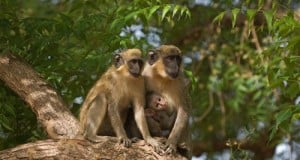A narration of two primary school kids about the mystery behind this precious animal and a call for its protection

Poised to eliminating this group of wildlife, our parents have therefore derived local techniques to keep them away from their farms. They visit renowned hunters in our communities, who visit the farms as early as 5AM, when these monkeys leave their habitats in search of food, and as they jump down the trees, they are surprised by the bullets of the hunters with at least 2 of them killed in each outing.
While some hunters hunt them for family consumption, others hunt them for commercial purposes-selling them for up to 15000FCFA depending on their sizes.
The green monkeys it should be noted are of great traditional values to our communities; they are considered as totems and so, many people buy, kill and use their hearts for rituals which too has greatly increased the demand for the monkey and their hunting rate in our communities.
As we grow up, our parents also charged us with the responsibility of guarding these crops against Nkeh consumption and since these animals visited our farms only by dawn (between 5 P.M and 8 A.M), when the environment is quiet and our parents (farmers) are still sleeping, we had to visit the farm too at dawn to chase them away. As we ‘interact’ with this wildlife on a daily basis, their behavior, agility, beauty and life style increasingly are becoming more fascinating to us.
One of the fascinating mysteries of the Nkehs, is their defensive mechanism against other predators like the elephant and bush pig, who kill them for food. Since these monkeys are commonly hunted by other animals at night while they sleep the Nkeh sleeps on tree tops and passes out faeces in their palms, which they hold till morning before dropping for fear that the larger animals will locate them by the scent of their faeces.
These animals are so wise and we love them. We just wish people will stop hunting them. They feed on our crops because we invade their habitats with our farms. We cut down their trees, leaving them homeless. They won’t visit the farms in and around the communities if we plant scarecrows in them, but they will keep destroying those in the forest because that is their home. No one can plant a mango tree in your land and deny you from feeding on it. Nkeh may just be animals for some humans but they are our pride and inheritance, they make us unique. I really hope someday our parents will understand these truths. I hope my friends; the Nkehs will one day be comfortable in their habitats. My best friend and I are mobilizing the other kids to join us protect these monkeys and conserve their habitats, it’s a big challenge but we are determined.
Narrated by Njifua & Tazi(members of the Environmental Club, GS Nzanchen)
10 Year-old Class Six Pupils of the Lebialem Forest Area
Picture Courtesy Ariandne Van Zandberrgen
Compiled by Mahah Vladimire



